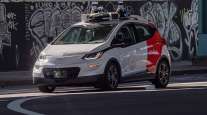Waymo, Uber Trade Barbs in Court Over Trade-Secret Theft Suit

Waymo and Uber lawyers squared off in a federal court on Feb. 5 on the first day of a bombshell trade-secret theft case.
The suit by Waymo, the self-driving unit of Google parent Alphabet, alleges that Uber stole technology crucial to self-driving cars. Uber denies doing so.
Each side picked a scapegoat. Waymo painted Travis Kalanick, Uber’s ousted CEO, as a cheater desperate to vanquish the competition. Uber said that Anthony Levandowski — a former star Waymo engineer whom Uber hired and later fired and who is now at the center of the case — was untrustworthy and self-serving.

Travis Kalanick (Imago/Zuma Press/TNS)
“The evidence will show that Mr. Kalanick made a decision that winning was more important than obeying the law,” Waymo attorney Charles Verhoeven told the 10-person jury. “He made a decision to cheat. For him, winning at all costs, no matter what, was his culture and what he was going to do.”
Verhoeven laid out Waymo’s case: that Uber and Kalanick “targeted and hired away from Waymo one of its key engineers with the self-driving program since its inception.” That engineer, Levandowski, allegedly downloaded 14,000 confidential Waymo files shortly before leaving the company, starting his own self-driving business and quickly selling it to Uber.
RELATED: Did Uber hide evidence? Judge in self-driving trade secrets case wants an snswer
“In their own own words, written documents (show) Mr. Kalanick said he wanted to use Mr. Levandowski to win at all costs,” Verhoeven said.

Anthony Levandowski (John Sommers II for Transport Topics)
Levandowski is not a party to Waymo vs. Uber. He has consistently refused to testify, asserting his Fifth Amendment right against self incrimination. He is involved in a separate mediation with Waymo.
Verhoeven said Waymo’s huge head start in self-driving technology caught Uber’s attention, and Uber decided to hire Levandowski as a way of getting “cheat codes.” Uber valued Levandowski’s and his company’s contributions as worth between $830 million and $4 billion, he said.
Uber retorted that Waymo’s entire presentation was untrue.
“It didn’t happen. There was no conspiracy, no cheating, period, end of story,” said Uber attorney John Carmody.
“There’s not a single piece of proprietary info from Google at Uber,” he said. “Not the 14,000 downloads, nothing.”
He claimed that Waymo instigated the lawsuit because it wanted a way to make “big bucks” from self-driving technology and decided a robot-taxi service would be that path. It saw Uber as a “formidable” competitor, he said.
RELATED: Uber’s well-paid ‘whistle blower’ slammed by in-house lawyer
“This case is really about Waymo wanting to stop its biggest competitor, Uber,” Carmody said.
Carmody had harsh words about the star engineer at the case’s center, calling him not trustworthy. “Uber regrets ever bringing Anthony Levandowski on board,” he said. “All Uber has to show for Anthony Levandowski is this lawsuit.”
Levandowski “was the hottest guy around — the hottest commodity in the whole autonomous vehicle business,” Carmody said. “The fact that Uber brought on some rock-star engineers doesn’t mean they’re guilty of wrongdoing.”
Waymo was similarly uncomplimentary about Levandowski. Waymo CEO John Krafcik, his company’s first witness, testified that Levandowski’s abrupt departure considerably shifted his perspective. Levandowski “had gone from someone I considered a friend to someone I considered an enemy,” he said, adding that having Levandowski work for a competitor would help that competitor.
Uber implied that Waymo brought the case because it was worried that it was bleeding talent. Carmody showed numerous emails, including ones to and from Google co-founders Larry Page and Sergey Brin, expressing concern about cutthroat competition in the self-driving industry, with companies like Tesla, Apple, Uber and Toyota “stalking our folks, willing to burn a lot of cash to catch up to us.”
But Krafcik said the motivation was more clear-cut. “We believe in this technology that will save a lot of lives in this world,” he said. “We came to find that aspects of our technology were taken from us in an unfair fashion.”
Portions of the Feb. 5 proceedings were closed to the public to delve into the eight specific trade secrets at issue — related to lidar, a laser form of radar that helps self-driving cars see the world around them in 3-D, 360-degree views.
Distributed by Tribune Content Agency, LLC




